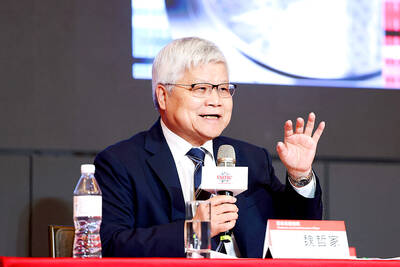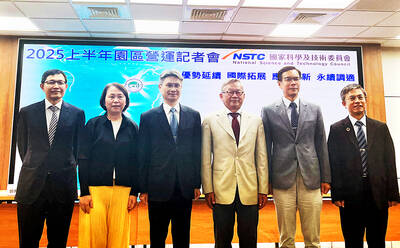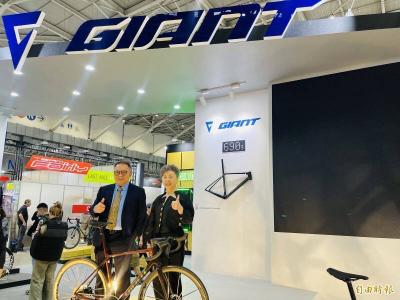Nanya Technology Corp (南亞科技), the world’s fourth-largest DRAM chipmaker, yesterday said its board has approved a spending plan that would see NT$40 billion (US$1.27 billion) invested over the next two to three years in upgrades to manufacturing facilities that would allow it to produce 20-nanometer (nm) DRAM chips.
That would make Nanya Technology the world’s fourth chipmaker capable of supplying 20nm DRAM chips after Samsung Electronics Co, SK Hynix Inc and Micron Technology Inc’s Inotera Memories Inc (華亞科技).
Inotera is a DRAM venture between Micron and Nanya Technology.
The advanced technology “will be a lifesaver for Nanya Technology,” company president Charles Kau (高啟全) told reporters.
“Only 20nm technology can be used to [cost-efficiently] make low-power DDR4 and DDR4 chips, which together will account for 80 percent of the world’s DRAM market in 2018,” he said.
Samsung’s newly released Galaxy 6 smartphone and One M9 handset from HTC Corp (宏達電) are equipped with low-power DDR4 chips, Kau said.
“Without low-power DDR4 chips, Nanya Technology’s sales and revenue will run out of steam in the future,” Kau said.
To fund the technological migration, Nanya Technology plans to raise up to NT$20 billion by issuing fresh shares to new strategic partners and by arranging bank loans in the second half of this year.
Kau declined to comment on speculation that Japan’s Toshiba Corp and US DRAM module maker Kingston Technology Corp are interested in forming a tie-up with Nanya Technology.
Nanya Technology plans to begin volume production of 20nm technology in 2017.
Based on Nanya Technology’s plan, half of its 60,000 wafer capacity will be upgraded to 20nm technology by licensing technology from Micron. The chipmaker now makes DRAM chips mostly on 30nm technology.
The company’s board also gave the go-ahead to distribute a cash dividend of NT$2 per share, after the company reported net income of NT$28.24 billion last year, or NT$11.77 per share.
The dividend payout represents 2.52 percent of dividend yield based on the stock’s closing price of NT$79.5 in Taipei trading yesterday.
Commenting on the global DRAM market outlook, Nanya Technology vice president Lee Pei-ing (李培瑛) said average selling prices of DRAM products would stabilize next quarter as demand gradually recovers from slow seasonal demand this quarter.
However, global PC demand is still weaker than expected for this quarter, which is likely to add extra pressure to the company’s average selling price, Lee said.
For the first two months of the year the company’s cumulative sales rose 0.37 percent year-on-year to NT$7.95 billion, according to data compiled by the Taiwan Stock Exchange.
Nanya shares rose 2.32 percent yesterday in Taipei trading, outpacing the broader market’s 0.76 percent increase.

Taiwan Semiconductor Manufacturing Co (TSMC, 台積電) yesterday reiterated that the company has not entered discussions with any company about potential investments or partnerships amid ongoing rumors of ailing Intel Corp seeking TSMC’s participation. In a statement, TSMC, the world’s largest contract chipmaker, dismissed a report by the Wall Street Journal, saying that Intel had approached TSMC soliciting investment in Intel’s manufacturing operations or a partnership. The company said it has never entered into talks with any company on establishing a joint venture or engaging in the licensing or transfer of technology. That stance was similar to previous statements made by TSMC chairman C.C.

PULLING AHEAD: TSMC aims to start production at the Taichung fab in 2028 using its most advanced technology, while 1.6nm chips would be made in Kaohsiung next year Taiwan Semiconductor Manufacturing Co (TSMC, 台積電) is to start building a new 1.4-nanometer fab next quarter with an anticipated production value of up to NT$500 billion (US$16.49 billion), the Central Taiwan Science Park Bureau said yesterday. TSMC, the world’s biggest contract chipmaker, is working at full steam to push forward the construction of its new factories at home, rather than taking a slower approach as some media speculated, bureau Director-General Hsu Maw-shin (許茂新) said. “Everything is on schedule. TSMC plans to start construction in the fourth quarter. It is planning a detailed construction schedule and arranging contractors to build the fab,” Hsu

RIGHTS CONCERNS: The Taiwanese bike maker said it is ‘committed to upholding human rights’ and would file a petition to seek the revocation of the US order Giant Manufacturing Co (巨大) yesterday said that it would petition US authorities to revoke a ban on imports of its bicycles from Taiwan as the world’s largest bike maker’s shares slumped over the US measure due to alleged forced labor. The Taiwanese manufacturer’s stock fell as much as 9 percent early yesterday after US Customs and Border Protection said its personnel would seize Taiwan-made Giant bikes and parts at the border, citing what it said was evidence of abusive working conditions, debt bondage and other indicators of worker abuse. Giant shares regained some momentum and closed 0.6 percent lower at NT$99.90. Giant said

US Customs and Border Protection (CBP) yesterday issued an order barring bicycles, bicycle parts and accessories made by Giant Group (巨大集團) in Taiwan over evidence of forced labor. CBP said it had issued a withhold release order to detain shipments of bicycles made in Taiwan by Giant — the world's largest bicycle manufacturer — under a law prohibiting goods made using forced labor from entering the US. The order does not appear to apply to Giant bicycles made outside of Taiwan. The company also has manufacturing facilities in China, Hungary, the Netherlands and Vietnam. An investigation of Giant had identified forced labor indicators,